
 Macbeth: A Verse Translation
Macbeth: A Verse TranslationWilliam Shakespeare
Kent Richmond (translator)
ISBN-13 9780975274385
Full Measure Press
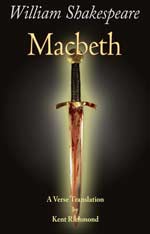
Macbeth: A Verse Translation
William Shakespeare
Kent Richmond (translator)
ISBN-13 9780975274385
Full Measure Press
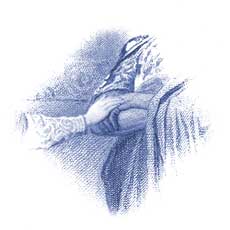

This complete, line-by-line translation of Macbeth makes the language of Shakespeare's play contemporary without modernizing the play in any other way.
Despite the rich, poetic dialogue, theatergoers in Shakespeare's time did not need scene summaries to follow the plot or footnotes to interpret vocabulary. Since Shakespeare's characters tell us rather than show us what they are thinking, the audience needed actors who spoke loudly, clearly, and quickly enough to finish the play in a few hours. Today we struggle no matter how clearly or slowly the actors speak, and reading too often is more like deciphering.
Kent Richmond's translation increases your comprehension yet has the feel of authentic Shakespeare. It preserves the rhythm and pacing of the original as much as possible and has the same sentence complexity and vocabulary range. You will soon forget that you are reading a translation. [read an excerpt]
Number of Unique Words
Shakespeare's original: 3,255
Richmond's translation: 3,290
Explore this tale of ruthless ambition with the challenge, comprehension, and delight of audiences 400 years ago—the way Shakespeare intended.
Excerpt from Macbeth: A Verse Translation
from Act 4 Scene 1
Scene One. A Dark Cave with a Cauldron
[Thunder. Enter the three WITCHES]
FIRST WITCH
Read another excerpt
Thrice the banded cat’s meowed.
SECOND WITCH
Thrice, and once the hedge-hog whined.
THIRD WITCH
The harpy cries “It’s time, it’s time.
FIRST WITCH
Round and round, you cauldron, spin;
Throw the poisoned entrails in.
Toads, that under cold stone lay,
Thirty nights and one more day
Till the sweated venom’s got,
Boil it first in this charmed pot!
ALL THREE
Double, double, toil and trouble;
Fire burn, and cauldron bubble.
SECOND WITCH
Fillet of swamp-bred snake,
In the caldron boil and bake.
Eye of newt, and toe of frog,
Wool of bat, and tongue of dog,
Adder’s fork, and blind-worm’s sting,
Lizard’s leg, and owlet’s wing,—
For a brew of powerful trouble,
Like a hell-broth boil and bubble.
ALL
Double, double, toil and trouble;
Fire burn, and cauldron bubble.
THIRD WITCH
Scale of dragon, tooth of mutt,
Witch’s mummy, jaw and gut
Of the salty, ravenous shark,
Root of hemlock dug in dark,
Spleen of unbelieving Jew,
Gall of goat, and twigs of yew
Sliced off in the moon’s eclipse,
Nose of Turk, and Tartar’s lips,
Finger from a fetus which
Whores left stillborn in a ditch,
Make the gruel as thick as pitch.
Then we add a tiger’s colon,
To the mixture in our cauldron.
ALL
Double, double, toil and trouble;
Fire burn, and cauldron bubble.
SECOND WITCH
Cool it with a báboon’s blood,
Then the hex is fixed and good.
[Enter HECATE with three of her WITCHES]
HECATE
O, well done! I commend your pains,
And everyone will share the gains.
And now around the cauldron sing,
Like elves and fairies in a ring,
Enchanting all that you put in.
ALL
Song: Black Spirits
Black spirits and white
Red spirits and gray;
Mingle, mingle, mingle
You that mingle may.
[Exit HECATE and her three WITCHES]
Around, around, about, about
The bad run in, the good keep out.
SECOND WITCH
There's a tingling in my thumbs,
Something wicked this way comes,
Open, locks, whoever knocks!
[Enter MACBETH]
from Act Two, Scene One
MACBETH
Go tell your mistress, when my drink is ready,
To ring the bell. Then you may go to bed.
Read another excerpt
[Exit SERVANT]
Is this a dagger that I see before me,
The handle toward my hand? Here, let me clutch you.
I do not have you, yet I see you still.
Are you not, fatal vision, evident
To touch as well as sight? Or are you but
A dagger in my mind, a false illusion,
Emerging from an overheated brain?
And yet this form looks just as tangible
As this one I now draw. [draws his dagger]
You guide me down the path that I was going
And are the instrument I was to use.
My eyes are either fools or worth more than
My other senses. I can see you still,
And on the blade and hilt are clots of blood,
Which were not there before.—There’s no such thing.
It is this bloody business which has done
This to my eyes. Across the world’s dark half,
Nature seems dead, encased in sleep, deceived
By wicked dreams. The sorcerer’s goddess Hecate
Receives the witches’ offering, and gaunt Murder,
Alerted by his sentinel, the wolf,
Its howl his timepiece, at a stealthy pace,
Moves ghostlike, with a rapist’s wary stride,
In on his prey. O, firm and stable earth,
Don’t hear my steps, or how they walk, for fear
These stones of yours will leak my whereabouts
And break the ghastly silence of this hour,
Which suits this deed. While I make threats, he lives.
Cold wind to cool hot deeds is all talk gives.
[A bell chimes]
I’ll go, and then it’s done. That chime’s my signal.
Don’t hear it, Duncan, for it is the bell
That summons you to heaven or to hell.
[Exit]
Read an excerpt from
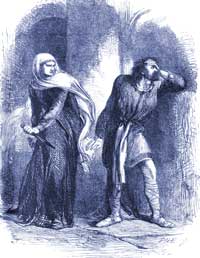
Lady Macbeth and Macbeth
Praise
"Too often, unless we read a Shakespeare play beforehand, we process the language as if it were coming from a poorly tuned-in radio station. Shakespeare didn’t write his plays to be experienced impressionistically as ‘poetry;’ he assumed his language was readily comprehensible. At what point does a stage of a language become so different from the modern one as to make translation necessary? Mr. Richmond is brave enough to assert that, for Shakespeare, that time has come. The French have Moliere, the Russians have Chekhov—and now, we can truly say that we have our Shakespeare.”
—John McWhorter, Manhattan Institute
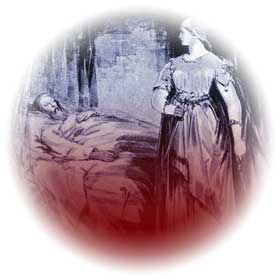
Lady Macbeth Retrieves a Knife
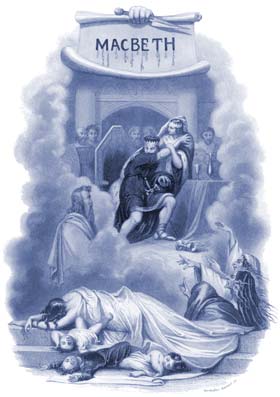
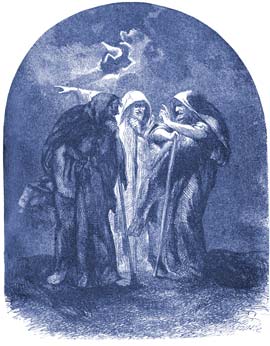
The Weird Sisters (the Witches)
